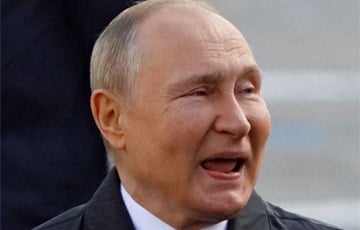The Economist: Putin's Awkward Act Showed His Weakness
- 25.03.2024, 13:41
- 12,594

It took him a full 19 hours to respond to the attack on Crocus City Hall.
After the ISIS terrorist attack in Moscow, which became a colossal failure of the Russian intelligence services and a slap in the face to Putin, the head of the Kremlin cowardly disappeared and reappeared almost a day later with a false statement in which he tried to ridiculously concoct blame for Ukraine. However, such behavior is traditional for the Russian dictator, writes the British magazine The Economist.
Putin is a man who likes victories; preferably stage-managed ones. A fixed election win followed by an exhilarating concert. A rousing Victory Day speech. Eight goals in an ice-hockey game. The dictator copes less well with unscheduled setbacks, preferring to disappear from the stage. In 2000 he fumbled his response to the Kursk submarine tragedy. He was absent for over a day following the failed storming of the Beslan school in 2004, in which 186 child hostages were killed. Last year, when Yevgeny Prigozhin and his band of mercenaries made their way towards Moscow, Putin was initially nowhere to be seen, the magazine writes.
So if he took a full 19 hours to conjure up a short tv performance to speak about the massive intelligence failure at Crocus City Hall in Moscow, he was falling into a familiar pattern.
The address itself gave little away—and appeared to serve as a hedge. Putin claimed, ludicrously, that Ukraine had opened a border “window” to the terrorists as they tried to escape Russia in their white Renault Symbol. (Eleven people that Russian authorities blame for the attack have been arrested.) But the Russian dictator stopped short of directly attributing responsibility to Ukraine for the attack—and said nothing about the Islamic State group that said it had carried it out.
Part of Putin’s reluctance to go all-in on blaming Ukraine might reflect a worry that the American government is sitting on intelligence that could undermine such a claim. Part might be embarrassment at his security agencies’ failure to act on American warnings on March 7th of an imminent attack.
Indeed, just three days before the assault Mr Putin had brushed off that intelligence as “blackmail”.
Such a hubristic blunder would have consequences in a country where power can be held to account. Russia is not such a country. The attack nevertheless represents a blow to the reputation of Putin and the security services on which he depends. The manner of the assault, in which at least 137 people lost their lives, will not soon be forgotten.
There are many questions over the inept security at the glitzy venue, which is in an entertainment park in Moscow’s north-west suburbs. It is unclear why local police failed to respond quickly. A producer of a show held at Crocus City Hall ten days before the attack noted that 200 security guards were present that night.
Some apparently unusual aspects of the attack—for supposed jihadists, the killers seemed keen to stay alive—have provoked conspiracy theories that parts of the Russian establishment may have been in on the act.
The more convincing explanation is that an Islamist terrorist group capitalised on Russia’s wartime distractions, ethnic tensions and economic difficulties.
The city of Moscow offers obvious opportunities for jihadist recruitment from among poor migrants from the mostly Muslim former Soviet republics in Central Asia.
These migrants represent an important cog in the wartime economy, taking low-paid jobs that Russians do not want, like road-sweeping and minimum-wage construction. But ethnic tensions have been rising. Putin spoke to them indirectly in his state-of-the-nation speech on February 29th, dialling down his previous nationalist rhetoric and emphasising Russia’s “multi-ethnicity”.
The Kremlin will no doubt use the Moscow attack as a pretext to tighten the domestic screws further. Some of its most loyal lieutenants have called for the cancellation of Russia’s moratorium on the death penalty for terrorism. That threat takes on extra significance in light of the Kremlin’s recent habit of applying that label to opponents of the regime, including an elderly writer of crime fiction.
Migrant communities are already feeling the pinch, with raids on mosques and hostels reported in major cities across Russia. But there is propaganda value in blaming Ukraine, and there are economic risks attached to threatening migrant workers. So the Kremlin is unlikely to deal with its security vulnerabilities systematically.
An intelligence source in Ukraine says he expects such efforts to be stepped up, using flimsy arguments to redirect blame.
“Perhaps they will start blaming France, too,” he quips. “After all, the men escaped in a Renault.”









